Oracles + Cyborgs
Oracular transmissions are poetic problems, mysteries crackling with secrecy and revelation both; signal & noise for the listener to divine, to decide through–––it’s no wonder that they are the utterances asked for at moments of crisis, for when the self or community has been brought to crossroads or crux; at these moments from prehistory to now various technologies of poesis have been a crucial resource for homo sapiens, but that designation with its focus on knowing and knowledge as the leading distinction of the human is precisely what the oracular reveals as always already a dead end on the path of being; and moreover the worldview that would hold the human as a possessor of knowledge is/was imbricated within a systems of violent exclusion, extraction and colonialization.
At Delphi the human was never the lone possessor of knowledge, sovereign agent moving and solving the problems of the city or being; rather we were always posthuman assemblages; admixtures across species within the gut, and consciousness both; a chimera of dreaming-thinking animal and ancestors; epigenetic echoes; hormonal replacement transformations; metabolic machines wandering among the metaphysics; evolution of all hominins riding the energies only technosociality makes possible; and we can hear it across the million years of music, in our very capacities for music and language both––so we’ll listen to these deep histories within our species, always already posthuman; how can this deep listening change our writing our musics; how can we channel the oracular transmissions faced with contemporary crisis; how to set write cyborg text, and set it to performance; how to cry out against the deep history of violence within the very concept of the human; how to regenerate from that catastrophe, and “consent not to be a single being” as Fred Moten tells it in his critique of the sovereign self.
Workshop Faculty for Week 1
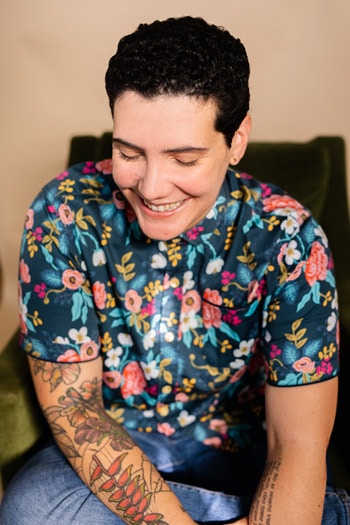
¡Publícame ésta! (Clothesline Poems) :: Raquel Salas Rivera
Moving between noise, sensation, and sense-making, this workshop will be about illegibility that veers into legibility or legibility that sometimes doesn’t give a fuck. Thinking of the ways in which sound, and noise in particular, mess with coloniality, we will work to produce poems that disrupt different registers, spaces, and notions of propriety. Readings, recordings, and performances might include Pedro Pietri, Roberto Ncar, Esteban Valdés, Julia de Burgos, Ángela María Dávila, Eduardo Alegría, Mickey Negrón, Fred Moten, the sounds of cacerolazos, scenes from #RickyRenuncia, and videos of confrontations with settler colonialists in Puerto Rico. There will be channeling, screaming, listening, movement, and writing with non-traditional materiales.
Raquel Salas Rivera (Mayagüez, 1985) is a Puerto Rican poet, translator, and editor. His honors include being named Poet Laureate of Philadelphia, the New Voices Award from the Festival de la Palabra, the Lambda Literary Award for Transgender Poetry, the inaugural Ambroggio Prize, the Laureate Fellowship, and a National Endowment for the Arts Fellowship to translate the poetry of his grandfather, Sotero Rivera Avilés. He is the author of six full-length poetry books, which have been longlisted and shortlisted for the National Book Award, the Pen America Open Book Award, and the CLMP Firecracker Award. He has co-edited two anthologies of Puerto Rican poetry, Puerto Rico en mi corazón (Anomalous Press, 2019) and La piel del arrecife (La Impresora, 2022), various folios, and the literary journal The Wanderer. In 2016, he became a founding member of the Yerbamala Collective, a group dedicated to the creation of antifascist poetic spells. His sixth book, antes que isla es volcán/before island is volcano, is an imaginative leap into Puerto Rico’s decolonial future and is forthcoming from Beacon Press in April 2022. Also in 2022, he will participate in no existe mundo poshuracán: Puerto Rican Art in the Wake of Hurricane Maria at the Whitney Museum of American Art, the first scholarly exhibition focused on Puerto Rican art to be organized by a large U.S. museum in nearly half a century, whose title borrows a verse his fourth poetry book while they sleep (under the bed is another country) (Birds, LLC, 2019). He holds a Ph.D. in Comparative Literature and Literary Theory from the University of Pennsylvania and teaches at the University of Puerto Rico. With a three-year grant from the Mellon Foundation, he serves as investigator and head of the translation team for El proyecto de la literatura puertorriqueña/ The Puerto Rican Literature Project (PRLP), a free, bilingual, user-friendly and open access digital portal that anyone can use to learn about and teach Puerto Rican poetry.
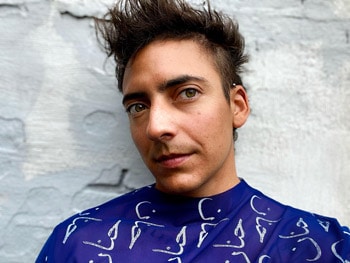
Poetry as Source Text for Performance :: Andrea Abi-Karam
When thinking of Cecilia Vicuña’s lines: “A poem only becomes poetry when its structure / is made not of words but of forces” we are moved to transform language into the physical. In this workshop, we will explore our own artistic lineages, look towards the conversations we want our work to be a part of or start anew. For sources for our own writing, we’ll consider the documentary and tactics to transform documentary from a poetics of witness to a poetics of accomplice through direct implication of all involved: reader, writer, subjectivities, and audience. Through a series of rapid fire free-writes and share-backs we will develop raw material that can be sutured into performance in collaboration with materials lists, performance maps, spontaneity, and each other. For inspiration we’ll look to Cecilia Vicuña, David Wojnarowicz, Marina Abramovic, Ron Athey, Solmaz Sharif, Etel Adnan, & Sarah Kane.
Andrea Abi-Karam is a trans, arab-american punk poet-performer cyborg, writing on the art of killing bros, the intricacies of cyborg bodies, trauma & delayed healing. Their chapbook, THE AFTERMATH (Commune Editions, 2016), queers Fanon’s vision of how poetry fails to inspire revolution. Under the full Community Engagement Scholarship, Andrea received their MFA in Poetry from Mills College. With Drea Marina they co-hosted Words of Resistance [2012-2017] a monthly, radical, QTPOC open floor poetry series to fundraise for political prisoners’ commissary funds. Selected by Bhanu Kapil, Andrea’s debut EXTRATRANSMISSION (Kelsey Street Press, 2019) is a poetic critique of the U.S. military’s role in the War on Terror. Andrea toured with Sister Spit in 2018 and has performed at RADAR, The Poetry Project, The STUD, Basilica Soundscape, TransVisionaries, Southern Exposure, Counterpulse, & Radius for Arab-American Writers. With Kay Gabriel, they co-edited We Want It All: An Anthology of Radical Trans Poetics (Nightboat Books, 2020). Andrea’s second book, Villainy (Nightboat Books, Sept 2021) reimagines militant collectivity in the wake of the Ghost Ship Fire and the Muslim Ban. They are a leo currently obsessed with queer terror and convertibles.
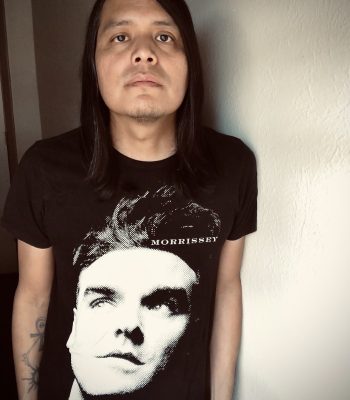
Poetry as Source Text for Performance :: Andrea Abi-Karam
When thinking of Cecilia Vicuña’s lines: “A poem only becomes poetry when its structure / is made not of words but of forces” we are moved to transform language into the physical. In this workshop, we will explore our own artistic lineages, look towards the conversations we want our work to be a part of or start anew. For sources for our own writing, we’ll consider the documentary and tactics to transform documentary from a poetics of witness to a poetics of accomplice through direct implication of all involved: reader, writer, subjectivities, and audience. Through a series of rapid fire free-writes and share-backs we will develop raw material that can be sutured into performance in collaboration with materials lists, performance maps, spontaneity, and each other. For inspiration we’ll look to Cecilia Vicuña, David Wojnarowicz, Marina Abramovic, Ron Athey, Solmaz Sharif, Etel Adnan, & Sarah Kane.
Andrea Abi-Karam is a trans, arab-american punk poet-performer cyborg, writing on the art of killing bros, the intricacies of cyborg bodies, trauma & delayed healing. Their chapbook, THE AFTERMATH (Commune Editions, 2016), queers Fanon’s vision of how poetry fails to inspire revolution. Under the full Community Engagement Scholarship, Andrea received their MFA in Poetry from Mills College. With Drea Marina they co-hosted Words of Resistance [2012-2017] a monthly, radical, QTPOC open floor poetry series to fundraise for political prisoners’ commissary funds. Selected by Bhanu Kapil, Andrea’s debut EXTRATRANSMISSION (Kelsey Street Press, 2019) is a poetic critique of the U.S. military’s role in the War on Terror. Andrea toured with Sister Spit in 2018 and has performed at RADAR, The Poetry Project, The STUD, Basilica Soundscape, TransVisionaries, Southern Exposure, Counterpulse, & Radius for Arab-American Writers. With Kay Gabriel, they co-edited We Want It All: An Anthology of Radical Trans Poetics (Nightboat Books, 2020). Andrea’s second book, Villainy (Nightboat Books, Sept 2021) reimagines militant collectivity in the wake of the Ghost Ship Fire and the Muslim Ban. They are a leo currently obsessed with queer terror and convertibles.
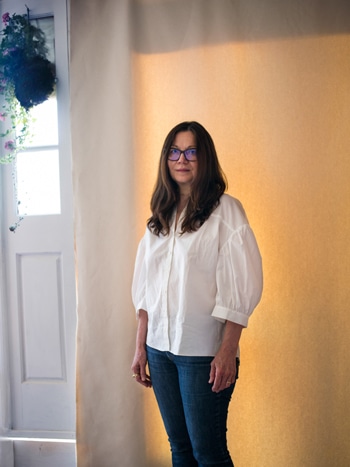
Of Pleasure and Poetics :: Brenda Coultas
Why are we here if not to be makers? How can we increase the scope of our vision and add to universal happiness? This workshop will consider writing wisely and responsibly about the difficult, the traumatic, the irreparable without sacrificing beauty. We’ll engage a range of forms and genres for increasing the vibration of the sublime, for testing the possibility of the oracular within the practice of forging new work. We will read Layli Long Soldier, Renee Gladman, Joanne Kyger, Marcella Durand, Hoa Nguyen, Gregory Corso, and more.
In the mid-90s, Brenda Coultas moved to New York City to work on the staff of the Poetry Project. Her poetry can be found in Bomb and Brooklyn Rail and the anthology Readings in Contemporary Poetry published by the DIA art foundation Press. Coultas was awarded a Robert Rauschenberg Artist Residency, as well as residencies at Ucross and the Gloucester Writers Center in 2020. Coultas’ books include A Handmade Museum, The Marvelous Bones of Time, and The Tatters. Her latest The Writing of an Hour, an ars poetica, was published by Wesleyan University Press this spring.
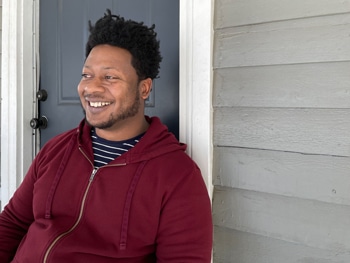
Applying Architectural Theory to Writing :: Steven Dunn
One of architecture’s goals is to design structures that are adapted to physical human use. Books are similar. Architecture often borrows language and theory from literature and linguistics to discuss its theories, and outside of construction metaphors, literature can also borrow the same from architecture. Using specific architectural theories such as “Neurophysiology of Ornamentation” and “Form & Pattern Languages”, we will look at how narratives/books are built and if they take into account how humans move through that space. We can look at ways to apply some of these theories to our own writing and arranging process, which can help us have an alternate view of how we are designing structures.
Steven Dunn, aka Pot Hole (cuz he’s deep in these streets) is a 2021 Whiting Award recipient for fiction, and the author of two novels from Tarpaulin Sky Press: Potted Meat (2016) and water & power (2018). Potted Meat was a finalist for the Colorado Book Award, and shortlisted for Granta Magazine’s Best of Young American Novelists, and adapted to a short film by Foothills Productions. The Usual Route has played at L.A. International Film Festival, Houston International Film Festival, and others. He was born and raised in West Virginia, and teaches in the M.F.A. programs at Regis University and Cornell College.
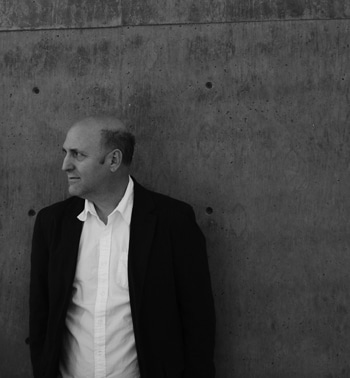
Gathering the Shards :: Charles Alexander :: Harry Smith Printshop
“Gather and disperse, contract and release.”
We shall gather and put together poems (or other texts) from various sources, as part of the cyborg theme, and thinking about such gathering, how it’s done, what it might entail, what such assemblage means, particularly in a time of dissolution, war, collapse, and with a sense of such struggles in history and poetry. We move to re-connect and re-posit, toward possible printing projects. A series of cards or same-shaped small broadsides, simple yet powerful, with each student making something of their own, and aiding each other, combining into a somewhat disrupted (and perhaps disruptive)“whole.” Print will join hand work, such as punching holes or making pattern marks, or folding or attaching or cutting or drawing or burning or what one’s imagination leads one to do.
Charles Alexander is a poet, bookmaker, professor, founder/director of Chax Press. He is the author of 6 full-length books of poetry and 13 brief chapbooks of poetry, editor of one critical work on the state of the book arts in America, author of multiple essays, articles, and reviews. Most recent books of poetry are AT the Edge OF the Sea: Pushing Water II (Singing Horse Press), Pushing Water (Cuneiform Press), and the chapbooks Some Sentences Look for Some Periods, and Two Pushing Waters, both from Little Red Leaves Textile Series. Pushing Water III is forthcoming from Cuneiform Press. He has taught literature and writing at Naropa University, University of Arizona, and elsewhere, including the University of Houston-Victoria, where he directed the MFA Creative Writing Program and managed the UHV Center for the Arts from 2014 through 2018. He has received the Arizona Arts Award, and has participated in the TAMAAS Poetry Translation Project in Paris, the US Poets in Mexico program, and the 7th International Chinese/American Poetry & Poetics Conference in Wuhan, Hubei, China. In April 2019, he was a keynote speaker and lecturer in the Swan Shakespeare Lecture series sponsored by Southwest University in Chongqing, China. He lives in Tucson, Arizona, with his partner, the painter Cynthia Miller.
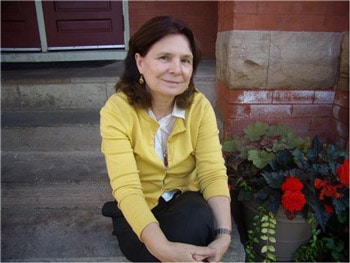
Dharma Arts :: Giovannina Jobson
Giovannina Jobson is an ordained minister in the Shambhala Buddhist tradition, (Upadhyaya) and a graduate of the MA Religious studies Program in Indo-Tibetan Buddhism and Contemplative Religions. Trained by Trungpa Rinpoche, Giovannina is a Dharma artist, social artist and mindfulness instructor. Giovannina has been a practicing Buddhist for over 40 years and is also a Shambhala Training director for Shambhala International. At Naropa she teaches Buddhist Studies courses as well as courses that focus on artistic expression inspired by the lives of renowned mystics from many traditions.
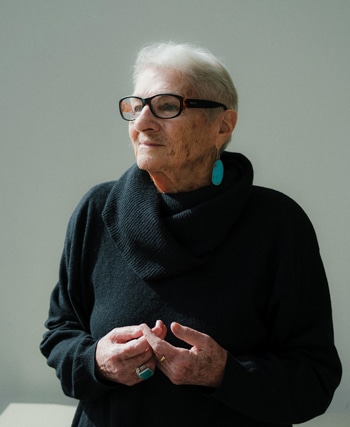
Guest :: Margaret Randall
Margaret Randall (New York, 1936) is a poet, essayist, oral historian, translator, photographer and social activist. She lived in Latin America for 23 years (in Mexico, Cuba, and Nicaragua). Randall received he 2017 Medalla al Mérito Literario from Literatura en el Bravo in Ciudad Juárez, Mexico. Most recent title Time’s Language: Selected Poems 1959-2018. Workbook: A memoir of Time and Place as well as the just released Artists in my Life.
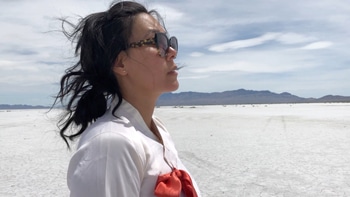
Guest :: Sueyeun Juliette Lee
Sueyeun Juliette Lee grew up 3 miles from the CIA and currently lives in Denver, CO. She is the author of Aerial Concave Without Cloud, and That Gorgeous Feeling, Underground National, Solar Maximum, and No Comet, That Serpent In the Sky Means Noise. A former Pew Fellow in the Arts for Literature, she also makes video and installation art. Find her silentbroadcast.com.
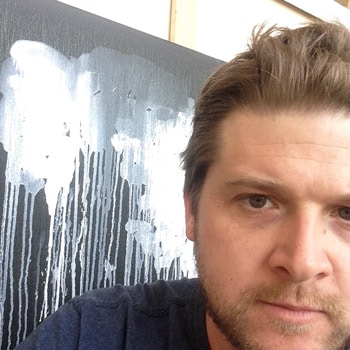
Harry Smith Recording Studio
Summer Writing Program participants (in select workshops each week) may have the opportunity to work in Naropa University’s Recording Studio. Sometimes the projects entail setting their work to music, or recording spoken word poetry, or recording their own poetic songs; oftentimes the recording studio projects are group collaborations, collective sound installations, and other experiments withthe phonotext. Over the year Fast Speaking Music has produced several audio anthologies of student and guest faculty’s recorded work; the Harry’s House cd compilations; here is the link to Volume III: https://spoti.fi/3v19mQP
Ambrose Bye is a musician, engineer, and producer living in Mexico City, and is the co-founder of Fast Speaking Music with Anne Waldman. He has produced over 20 albums and frequently collaborates with poets. Recent productions include “Among the Poetry Stricken” (Clark Coolidge and Thurston Moore) and “Artificial Happiness Button” (Heroes are Gang Leaders). He has worked and performed at Masnaa and the Ecole de la Literature in Casablanca, Le Maison de Poesie in Paris, the fieEstival Maelstrom in Brussels, the Henry Miller Library in Big Sur, Pathway to Paris at Montreal POP 2015, and Casa Del Lago in Mexico City. He has also been involved in the recording studio and workshops at the Summer Writing Program at Naropa University since 2009.
Fast Speaking Music



